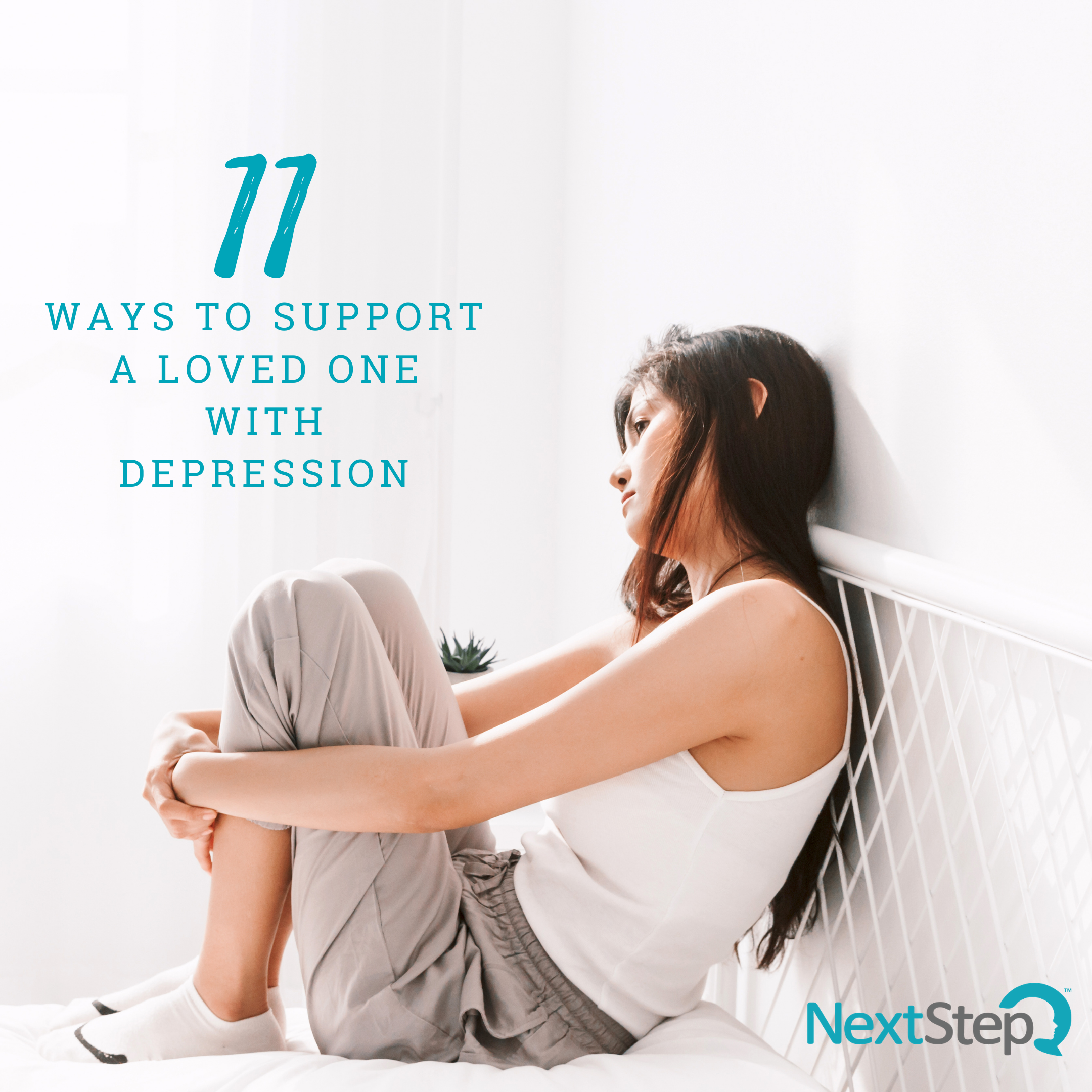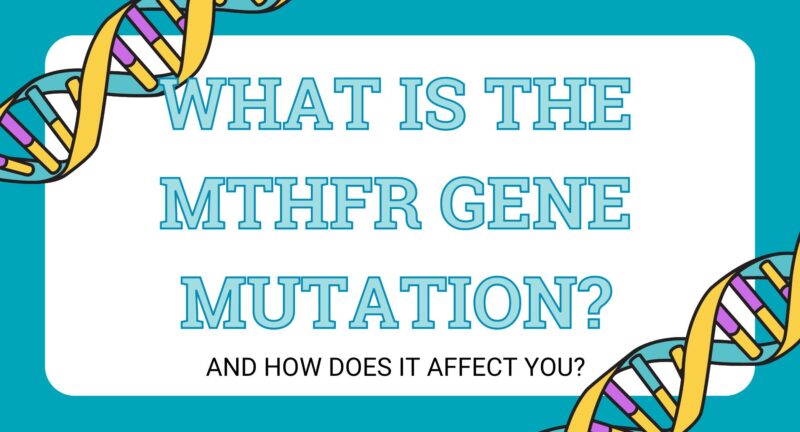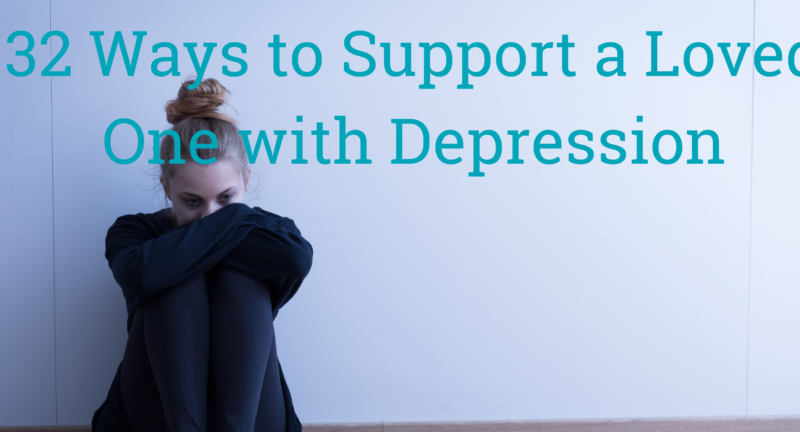
11 Ways to Help Someone with Depression
If a family member or loved one has depression, you might wonder what you can do to help them feel better. You might even feel confused or worried for your loved one.
At Next Step 2 Mental Health, our team of caring providers wants you to know that depression is treatable. In this article, we’ll explore 11 ways you can help someone in your family with depression.
11 Ideas to Help a Loved One with Depression
It can be overwhelming to see a loved one struggle with the symptoms of depression, but here are 11 ways you can help.
1. Practice Self-Care … and Take Care of YOU

You’ve probably heard the phrase: “You can’t pour from an empty cup.” Before you can help your loved one, you have to take care of yourself too. That means your physical and mental health. If you’re burnt out, it can be hard to care for another person. Taking a step back to recharge yourself can give you the energy you need to care for a loved one.
Self-care ideas include:
- Eating nourishing meals
- Exercising regularly (read this article to find out how nature improves your mental health)
- Getting quality sleep (aim for at least 7-9 hours of sleep each night)
- Allotting time for your own favorite hobbies
- Reading a relaxing book
You can also encourage self-care habits for your entire family.
2. Acknowledge Your Own Feelings
Depression doesn’t just impact your loved one. It can affect your entire family. Caring for a spouse or teen with depression can be overwhelming. Don’t ignore your feelings. They are normal and valid. You can’t control what you feel, but do know that your feelings are a natural response to what can be a potentially overwhelming or difficult situation.
You may find it valuable to join a caretaker/family support group, talk with with your spouse (which is especially important if you are both caring for a child or teen with depression), or even see a therapist yourself. The important thing is to be open about your frustrations rather than keep them pent up inside.
3. Learn as Much as You Can About Depression
Depression is well-known for causing intense sadness, but that’s not the only symptom. Depression can affect people differently. Take the time to read about seasonal affective disorder, how depression physically affects the human body, and explore the lesser-known symptoms of depression.
You might notice any of the following in your loved one:
- Weight changes (either losing or gaining weight)
- Loss of interest in favorite hobbies
- Changes in eating habits (including eating more and eating less)
- Sleep disturbances and insomnia
- Sleeping too much or not enough
- Feeling guilty
- Feeling worthless
It’s also important to note that depression causes physical symptoms too. Your partner or teen might complain of headaches, muscle tension, and stomach pain.
Monica Clark, LPA elaborates: “Depression is not just in your head.” She continues to share that depression can cause real, tangible pain. Depression can alter the way your loved one experiences pain. It can decrease his/her pain tolerance.
4. Research Disability Laws and Rights
If your loved one can’t work due to depression, you might want to learn more about any pertinent disability laws. The American Disability Act (ADA) defines a disability as a physical or mental impairment that substantially limits a major life activity. Under this law, individuals have the right to privacy as well as the right to ask for reasonable accommodations.
5. Be Supportive

One of the most helpful things you can do is to let your loved one that you are there for them. Support – in the form of a listening ear or a shoulder to cry on – can be comforting
Be patient, but let your loved one know you are there for them in whatever way they need.
Depression is not their fault and it doesn’t make someone lazy, worthless, or weak. Don’t be afraid to ask how you can best help out. You’ll never know what a simple offer to help can do until you try.
6. Don’t Take Withdrawal Personally
People with depression may withdrawal or avoid social outings or events. Try not to take withdrawal personally. Withdrawal can be hurtful, especially if it’s your spouse that pulls away. Recall from your research on depression that loss of libido can be a sign of depression – and not a sign that something is wrong with you.
Withdrawal (or even an angry outburst) may have nothing to do with you.
7. Resist Nagging
Depression can cause fatigue and loss of interest in normal everyday routines. On the outside, it might look as if your loved one is lazy – especially if they stop helping out around the house. However, a person with depression isn’t lazy. They are struggling with a mental illness.
Try to remember that everyday activities – such as paying a bill or even feeding a beloved pet – can be very overwhelming for someone with depression.
Try not to blame your loved one – or yourself. There’s no shame in asking for help.
8. Learn about Depression Treatments
Although depression can be incapacitating, it can be treated with therapy, lifestyle changes, and medication. One easy way to help your loved one is learn about potential treatment options, including how depression medication works.
You might want to learn:
- How depression medication works
- What are the potential side effects
- How to tell if a treatment is no longer working
- How to tell if your teen has stopped taking medication (withdrawal symptoms)
If you’re helping your teenager manage his or her depression, you might set up online therapy appointments, encourage healthy lifestyle changes, and make sure they take their medication as described – and reassure them that medication isn’t a sign of weakness.
9. Offer Hope to Your Loved One

“Once you choose hope, anything is possible.” Christopher Reeve
Offering hope to a loved one can give them the courage to get dressed each morning. Hope comes in many forms. It might faith in God, the thought of their children, or even a pet – or anything that gets your spouse or teen out of bed each morning.
Tip: Know what matters to your spouse or teen (like children or a pet) and find ways to remind him or her of these sources of hope when they are struggling on a bad day.
10. Know When You Need Immediate Help
If your family member is showing signs of suicidal thoughts or is self-harming, he or she needs immediate help.
Out of an abundance of caution and for the sake of safety, familiar yourself with these red flags:
- Preoccupation with death
- Signs of self-harm
- Creating a will and/or giving away possessions
- Talking openly about suicide
- Saying goodbye as though it’s the last time
- Statements like, “You’d be better off without me” or “Maybe I should just go away”
- Suddenly switching from being very depressed to being very happy without reason
If you are feeling suicidal, thinking about hurting yourself, or are concerned that someone you know may be in danger of hurting himself or herself, call the National Suicide Prevention Lifeline at 1-800-273-TALK (1-800-273-8255). It is available 24 hours a day, 7 days a week and is staffed by certified crisis response professionals.
11. Love Them Unconditionally
Feelings of guilt or worthlessness often accompany depression. These feelings may cause a person with depression to feel like a burden. To mitigate these feelings, let your loved one know that your love is unconditional.
Explore Your Next Steps
Regardless of what type of mental health concerns you have, our team of skilled and compassionate providers can help you and your family regain control of your life. At Next Step 2 Mental Health, it’s our mission to help you live a happier life, a better life.
Give us a call at our Louisville, Kentucky office at 502-339-2442, or send us a message to request more information.
You can also request an appointment with our convenient scheduling tool here.
Related Posts
What Is the MTHFR Gene Mutation? And How Does It Affect You?
In recent years, the MTHFR gene has garnered attention for its role in various...
32 Ways to Help Someone with Depression (When They Don’t Want to Talk about It)
Depression can be debilitating, and if it's your child or spouse or friend...


